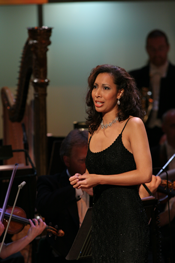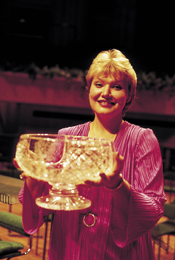Recently in Commentary
Oct. 25, 2007, Sala Cecilia Meireles
I met the young gaucho composer Dimitri Cervo at the 2003 Bienal of Contemporary Music, where his works for solo flute and strings, Pattapiana [named for Pattapio Silva, a great Brazilian flutist who died tragically
young at the beginning of the last century] made quite an impression.
There’s still a hint of jest in the comparison, but it’s not without reason that Jake Heggie and Terrence McNally are mentioned now and then in opera circles as “the Strauss and Hofmannsthal of the 21st century.”
Incoming general director of Santa Fe Opera, Charles MacKay, has made clear he is “in the tradition -- I will not be an agent for radical change,” at the celebrated New Mexico summer opera festival, MacKay says.
Composer Frederick Carrilho was born in 1971 in the state of Sao Paulo, and has studied guitar and composition, most recently at UNICAMP in Campinas. His music has been heard at the recent biennial festivals of contemporary music in Rio, with the Profusão V – Toccata making a strong impression at the Bienal of 2007. We spoke in Portuguese.
October 23, 2007, Sala Cecilia Meireles, Rio de Janeiro
What makes the first visit to Guanajuato’s Teatro Juárez breathtaking is the suddenness of the encounter.
Oct. 25, 2007, Rio de Janeiro.
José Orlando Alves is a young composer, originally from Minas Gerais, but who spent many years in Rio de Janeiro, where he has been active for a decade with the composers’ collaborative, Preludio XXI.
In the long ago, when the best source of music reproduction in the home was a handsome piece of furniture, fitted with hidden audio components, and usually called radio-phonographs, my family had one — from Avery Fisher I believe — that had among its controls a switch labeled ‘presence.’
Uncut with Canada’s Mistress of the trouser-role: the multifaceted Kimberly Barber.
Glimmerglass Opera is in a watershed year. With the departure of Paul Kellogg, who had considerable success developing that annual festival, General and Artistic Director Michael Macleod has chosen to begin his tenure with a variation on the usual four-opera-season, namely a thematic collection
of pieces based on the “Orpheus” legend. “Don’t look
back” is the marketing catch phrase.
Almost thirty years ago a century old tradition ended with the last performance of I Maestri Cantatori.
Santa Fe Opera’s announcement August 10 that English-born impresario, Richard Gaddes, General Director of the company since 2001, will retire at the end of season 2008, took the local opera community by surprise.
The week just ended was certainly of historic moment in the world of North American opera companies.
Perhaps it is a sign that, at last, the countertenor voice has come of age in the hearts and minds of both audiences and the opera establishment.
Charleston, S.C. — For over 20 years it was two operas a season here at Spoleto USA, the all-arts
festival brought to this cultural capital of the Old South by Gian Carlo Menotti in 1977.
It is every young opera singer’s dream.
On May 9th, when Santa Fe Opera finally announced that Alan Gilbert had left his post as Music
Director of that company, a long-standing rumor was made official.
Robert Gierlach wishes he could rewrite “Anna Karenina,” the Tolstoi whopper turned into an opera by librettist Colin Graham and composer David Carlson. It’s not that Gierlach, who sings Vronsky in the world premiere of the work at Florida Grand Opera on April 28, has misgivings
about the author’s artistry; he simply wishes that the story could have a happy ending.
In 1966 Jørn Utzon was forced to quit as architect of the Sydney Opera House before it was complete. Next week, the first new interiors he and his son have designed will be revealed. Louis Jebb reports 07 September 2004...
Commentary

17 Jun 2007
New Frocks for Old – Cardiff Singer of the World, 2007
Back in the early 1980’s two good ideas came to fruition: the much-needed new concert hall for Cardiff, capital city of Wales, and plans to hold within it the first “Singer of the World” competition.
When one looks back at early videos of the first competition in 1983 and compares
with today’s slick production several things become evident. In 2007 there is a far larger
geographical spread of contestants and there is now remarkable vocal quality-in-depth. On a
more frivolous front, and perhaps indicative of current obsessions with image in the world of
opera, the frocks on display have also become extremely sexy and chic compared to their
distinctly dowdy predecessors. The men’s tailoring has changed rather less, it must be said,
although it is obvious that they, too, are now more aware of their presentation on stage – one
Finalist this year, countertenor David DQ Lee, looking particularly stylish.
Since that first competition (which, incidentally, Karita Mattila won) there have been many
exciting, memorable performances and vocal trials of strength. Who can forget the 1989 “battle
of the baritones” between Bryn Terrell and Dmitri Hvorostovsky? This bi-annual contest has
grown steadily in size and stature over the years, and it is now regarded as one of the premier
singing competitions in the world. Certainly recent Winners and Finalists of both the Main Prize
and the Lieder Prize read like a contemporary hall of fame: Nicole Cabell, Ailish Tynan, Katarina
Karnéus, Lisa Gasteen, Marius Brenciu, Christopher Maltman and Andrew Kennedy, to name
just a few.
 This year’s competition will have been hard-fought and exhausting for both juries and
contestants – over 1000 people applied to take part, 677 from 64 countries took part in auditions
held in 44 locations around the globe, and the final 25 singers who have survived the selection
process so far arrived in Cardiff this week. Although the two Prizes are valuable in monetary
terms - £15,000 and £5,000 for Singer of the World and the Rosenblatt Recital Song Prize
respectively with £2,500 for each of this year’s other four finalists – it is the world media
exposure that is often the key to future success for these young performers. Cardiff is a shop
window, par excellence.
This year’s competition will have been hard-fought and exhausting for both juries and
contestants – over 1000 people applied to take part, 677 from 64 countries took part in auditions
held in 44 locations around the globe, and the final 25 singers who have survived the selection
process so far arrived in Cardiff this week. Although the two Prizes are valuable in monetary
terms - £15,000 and £5,000 for Singer of the World and the Rosenblatt Recital Song Prize
respectively with £2,500 for each of this year’s other four finalists – it is the world media
exposure that is often the key to future success for these young performers. Cardiff is a shop
window, par excellence.
One very famous face who is there to welcome them is the competition’s Patron, Dame Joan
Sutherland who said “the competition is always a wonderful experience for not only the St.
David’s Hall audience and multimedia audiences across the world, but is also a delight for every
competitor taking part.” Today, Cardiff Singer of the World is very much a global
entertainment, with a TV, radio and online audience of eight million able to watch, listen and
download information on the wealth of young vocal talent on display, not forgetting, of course,
those frocks.
The competition is now under way with the two Finals being decided on Friday and Sunday
nights. Details of timings, tickets, master classes and contestants are available online at
www.bbc.co.uk/cardiffsinger
Sue Loder © 2007

 This year’s competition will have been hard-fought and exhausting for both juries and
contestants – over 1000 people applied to take part, 677 from 64 countries took part in auditions
held in 44 locations around the globe, and the final 25 singers who have survived the selection
process so far arrived in Cardiff this week. Although the two Prizes are valuable in monetary
terms - £15,000 and £5,000 for Singer of the World and the Rosenblatt Recital Song Prize
respectively with £2,500 for each of this year’s other four finalists – it is the world media
exposure that is often the key to future success for these young performers. Cardiff is a shop
window, par excellence.
This year’s competition will have been hard-fought and exhausting for both juries and
contestants – over 1000 people applied to take part, 677 from 64 countries took part in auditions
held in 44 locations around the globe, and the final 25 singers who have survived the selection
process so far arrived in Cardiff this week. Although the two Prizes are valuable in monetary
terms - £15,000 and £5,000 for Singer of the World and the Rosenblatt Recital Song Prize
respectively with £2,500 for each of this year’s other four finalists – it is the world media
exposure that is often the key to future success for these young performers. Cardiff is a shop
window, par excellence.